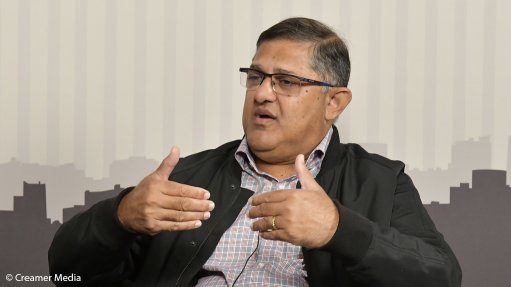
Deputy Minister of Forestry, Fisheries and the Environment Narend Singh
Photo by: Donna Slater
Honourable House Chair
Minister of Forestry, Fisheries and the Environment, Dr Dion George,
Deputy Minister Swarts
Honourable Members present,
I am delighted and honoured to have been given this responsibility and appointed by President Ramaphosa to serve in his cabinet as Deputy Minister in the Ministry of Forestry, Fisheries and the Environment.
I am fortunate in that I am no stranger to this portfolio, having been a past member of the portfolio committee on DFFE and a past MEC for Environment in the province of KwaZulu-Natal.
Together with the late Leader of the Inkatha Freedom Party, His Excellency Prince Mangosuthu Buthelezi, who himself was an avid environmentalist, and with other luminaries such as Dr Ian Player, I was involved in many environmental projects at the National, Provincial, and Local government levels.
Today I want to touch on a few key issues that we will focus on during the 7th administration.
We will aim to deepen our quest to accelerate the enforcement of environmental laws, combat the poaching of our fauna and flora, and end illegal fishing while enhancing regulatory frameworks to ensure that conservation efforts complement sustainable economic growth and job creation.
Although fundamentally anthropocentric, our constitutional injunction, as enshrined in Section 24 of the Constitution, should be extended where possible. We should all start to realise the direct and indirect effects that our actions have on all living things.
To quote one of the leading proponents of biocentricity, philosopher Aldo Leopold, who said that when dealing with the environment, “A thing is right when it tends to preserve the integrity, stability, and beauty of the biotic community. It is wrong when it tends otherwise.”
Enforcement
To strengthen the enforcement capabilities of environmental legislation, the National Environmental Management Laws Amendment Bill (Admin Penalties Bill) will provide an Administrative Penalty System as an additional enforcement tool for environmental contraventions.
Our enforcement arms must receive more significant resources, both in terms of capacity and logistical support. Specialist training is crucial, as well as intelligence sharing between other state security and policing agencies.
Fisheries Compliance and Law Enforcement
We will review the Marine Living Resources Act, 18 of 1998, for the 2024/25 financial year.
Our work through the Fisheries Management branch will focus on strategies to rebuild West Coast rock lobster and abalone resources.
We will partner with stakeholders to combat poaching and Illegal, Unreported, and Unregulated (IUU) activities that impact South Africa’s fish stocks.
It is crucial to us that the socio-economic needs of fishing communities are thoroughly considered in all decision-making processes.
The Department remains committed to ensuring compliance with international fisheries obligations, which aim to promote the sustainable management of fisheries and marine resources and, most importantly, preserve our rich marine biodiversity.
Transformation
The transformation of the Biodiversity Sector is non-negotiable and remains a key focus. This position was cemented with the recent revision of the National Biodiversity Economy Strategy (NBES), which seeks to advance an inclusive biodiversity sector that enhances local beneficiation of indigenous biological and genetic resources for sustainable prosperity for both people and nature.
Transformation is one of the key pillars of the NBES, aiming to include rural communities and previously disadvantaged individuals in the biodiversity economy for rural socio-economic development.
Oceans and Coasts
With regard to Oceans and Coasts, this financial year, we aim to monitor water quality in 45 priority areas in the four coastal provinces.
Ocean governance through management of environmental sustainability requires appropriate Marine Spatial Planning, which is a key priority for the programme and offers numerous benefits. It contributes to the sustainable management of marine resources and supports economic, environmental, and social goals.
As we navigate the complexities of marine conservation and protection, MPAs emerge as indispensable tools in our arsenal. MPAs in South Africa support sustainable fisheries, boost tourism, conserve biodiversity, promote research and education, enhance climate resilience, and preserve cultural heritage.
Since 2019, 20 new MPAs have been declared, increasing the conservation estate of the EEZ to 5.4%, totaling 42 MPAs. We are committed to achieving the Kunming-Montreal Global Biodiversity Framework's goal of protecting at least 30% of coastal and marine areas, prioritizing those with high biodiversity and ecosystem value, through a network of protected areas and conservation measures that are effective, representative, connected, and equitably managed.
iSimangaliso Wetland Park
To address transformation and socio-economic development, the management of iSimangaliso Wetland Park Authority ringfenced 40% of opportunities for previously disadvantaged community groups, with the latest allocation achieving 32%. This includes concessions like the boating concession at Kosi Bay Lakes.
Notably, iSimangaliso Wetland Park has maintained a zero, rhino poaching record over the past two years.
To ensure comprehensive stakeholder buy-in, iSimangaliso engaged with Amakhosi, Ezemvelo KZN Wildlife management, local traditional leaders, land claimants, and other stakeholders.
Subcontracting and employment for local small businesses were prioritized, creating 40 SMMEs and 400 job opportunities.
The overall strategy aims to combat rhino poaching, supported by Ezemvelo KZN Wildlife's increase in field rangers, deployment of tracking devices, and implementation of the World Wildlife Fund (WWF)-funded rhino dehorning process, all of which contribute to positive outcomes in conservation efforts.
Conclusion
In closing, to my colleagues, Minister Dr Dion George and Deputy Minister Bernice Swarts, our work is cut out for us. As we embark on this journey, I am confident that through collaboration and concerted efforts, we can achieve a harmonious balance between environmental conservation and economic prosperity for all South Africans.
House chair, allow me to thank the Director General, Ms Nomfundo Tshabalala, and the DFFE team, the board chairs, members, and CEOs of our entities for the sterling work they continue to execute in the Forestry, Fisheries, and Environment sector.
We will work with the Portfolio committee to ensure that the Department is held accountable.
Thank you.